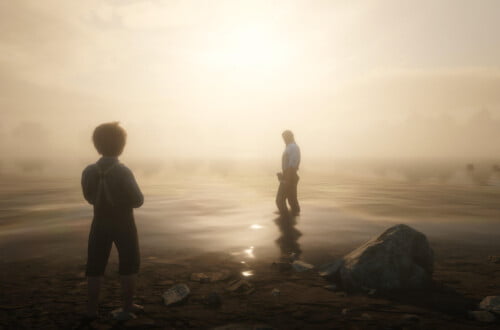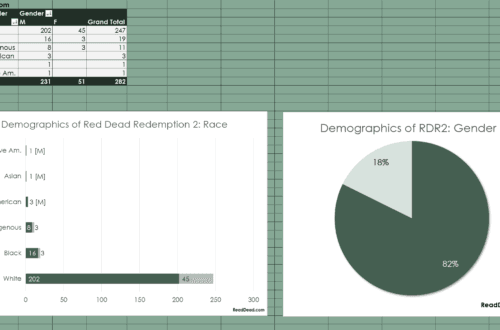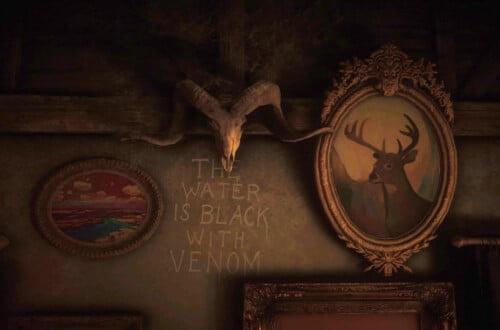The concept of free will in Paradise Lost, game design, and whether player has any real choices in Red Dead Redemption 2.
All posts on this site feature detailed discussion of literary allusions in Red Dead Redemption 2, and as such contain unmarked major and minor spoilers for the game, and occasionally the eventual fates of some characters in Red Dead Redemption. Read at your own risk.
In Red Dead Redemption 2, choices for the player are plentiful, but they rarely have any impact on the game’s narrative. At most, they affect its mood. Of course, in any story game the outcomes have to be predetermined (at this stage, at any rate), but the differences that appear in the story are small indeed. The player can’t change any outcome; you can’t save anyone.
One of the concepts John Milton addresses in Paradise Lost is predestination. Predestination is an apparent theological paradox: if God is omniscient, he knows who’s going to be damned and who is going to be saved. If our destiny is already written, how can we be said to have free will? Milton’s God explains that people cannot blame him for their actions
As if predestination overruled
Paradise Lost III.114-119
Their will, disposed by absolute decree
Or high foreknowledge; they themselves decreed
Their own revolt, not I: if I foreknew,
Foreknowledge had no influence on their fault,
Which had no less proved certain unforeknown.
God knowing what’s going to happen doesn’t mean he’s making it happen. Humans are still choosing their own fate of their own free will.

Choices in Red Dead Redemption 2
The questions of free will and predestination show up in Red Dead Redemption 2 in the form of characters claiming that they don’t have choices. In “Sodom? Back to Gomorrah,” Arthur — at his nastiest, because he’s ashamed and angry about what he’s doing — tells Edith Downes, “[Thomas] had a choice. Ain’t my fault about the way the world is.” Edith responds, “He didn’t have a choice. He was good, and he did good. There wasn’t no choice in that. And you as good as killed him yourself, and don’t kid yourself. You had a choice.” Edith, like many of the women in the game, is generally more an edifying messenger for Arthur than a developed character. The truth, however, is that both men had choices. Whatever pressures were on the Downes, taking the loan was Thomas’s choice, just as collecting on it was Arthur’s. Thomas didn’t have to introduce violence into their interaction by swinging a rake at Arthur’s head. Arthur didn’t have to retaliate.
When Hosea tries to stop Dutch from robbing the first train — a robbery that hastens their doom — Dutch dismisses him by saying “What choice have we got?” (“Who the Hell is Leviticus Cornwall?”). Arthur, in “Fatherhood and Other Dreams II,” barks at Mary, “What choice did I have? Did I ever have?” In “Red Dead Redemption,” when John confronts Dutch about abandoning him, Dutch tells him, “I didn’t have a choice.” John himself, perhaps unaware that he’s echoing this betrayal, asks Abigail what choice he has several times at Pronghorn Ranch.


Although the narrative never addresses social inequity with any depth or nuance, it’s interesting that we only hear this question from able-bodied, literate, English-speaking white men with North American accents. In the game’s setting, as is still the case in the U.S., this is the group of people with the most choices. (Given the way Rockstar writes and markets their narratives, it’s safe to say they aren’t putting those words in these characters’ mouths to acknowledge this, but because these are the characters they deem important enough to develop their themes.)1 Compare Arthur, Dutch, and John’s plight to that of Rains Fall and Eagle Flies. They can’t win against the United States government, nor can they simply acquiesce to the seizure of their treaty-guaranteed lands. What choice do Dutch, Arthur, and John have? At the risk of being simplistic, Arthur could leave the gang and, as he shouts at Strauss, get a job (“Money Lending and Other Sins VII”). John could grow up and stop endangering himself and his family. Dutch could have gone back for John, who clearly could have been rescued (since he managed to get out by himself), and clearly could have been rescued by Dutch specifically (since John’s angry accusations show that he saw Dutch come back for him, and then abandon him). When John was captured at Lemoyne National Bank, he tells Arthur, Dutch “saw it. Felt almost like he had a … a moment to do something and didn’t” (“Visiting Hours”). He may have doubted Dutch’s betrayal before, but whatever happened after John fell from the train, John is sure that it was deliberate.
Throughout the game, Dutch has excused his actions by denying that he has options, but he couches this in ambiguous language: “I don’t see what other choice we have” and “What choice have we got?” Now, when he tells John “I didn’t have a choice,” it’s just a lie. The question, with Dutch, is always the degree to which he knows he’s lying.

Choices that Matter
The narrative itself is somewhat ambivalent on the matter. Ostensibly, the characters do have choices — but at the same time, the game tends to support their assertions, since their claims burnish the romantic idea that they are doomed and tragic figures. In that sense, the game seems to argue against Milton. However, it’s also impossible to read Paradise Lost and feel that Adam and Eve can do anything but break God’s rules, and in that sense, it feels fated, no matter what Milton says about predestination and free will.
Objectively, it’s not the case that the main characters in Red Dead Redemption 2 don’t have choices. Rather, they don’t like their options. They don’t wanna. They don’t wanna shovel cowshit or use their words. They don’t wanna stop playing king to their clutch of blue-eyed sons. They don’t wanna get jobs, answer to anyone, take responsibility, grow up. They are, like Eve, doing what they want to do, heedless of the consequences.
It’s true that there are practical hurdles to making different choices. Arthur is a career criminal; getting a job, as we later see with John, isn’t always an easy matter. Rescuing John could have gotten Dutch killed. John was hired at Pronghorn because of his ability to protect the ranch, not because they needed a farmhand who doesn’t know anything about animal husbandry.
But the men are also psychologically hobbled. Arthur feels unable to leave the gang because of the values Dutch has drummed into him since he was a vulnerable and angry boy. Dutch’s paranoia and narcissism mean he no longer trusts John or cares about saving him. John is doing what he’s always done because changing is hard. None of that means that they don’t have choices. What they don’t have is the will, or perhaps the strength, to make those choices.

Ironically, it’s the player of Red Dead Redemption 2 whose choices are harshly curbed, no matter what the game overtly claims. The player is never offered the choices they are encouraged to want to make — the choices that Arthur wants to make, even if he’s conflicted — leading to a frustrating, if subtle, sense of ludonarrative dissonance. Ludonarrative dissonance is the psychological unease that arises when a game’s narrative and its gameplay are at odds. RDR2 wants the player to make “honorable” choices; it almost insists on it sometimes2 — and yet forces the player, as Arthur, into dishonorable actions. The psychological imperatives guiding Arthur through these actions are not entirely convincingly portrayed. Based on his character, one would expect him to leave Micah to hang, but for plot reasons, he has to shoot up Strawberry. He can’t refuse to collect Thomas Downes’s debt, even though the work “revolts” and “shames” him (journal entry after “Money Lending and Other Sins I”). He can’t leave the gang and run away with Mary. The game wants it both ways: Arthur has choices, but he can’t actually make them. Here, again, the game’s themes diverge with Paradise Lost — as perhaps they must, given the formal limitations: some things are predestined.
New here? Visit the Table of Contents to read the essays in order, or the Index to explore the site by topic. New essays are published Wednesdays at 1 p.m. E.T./10 a.m. P.T. Sharing the site is always appreciated!
- For an insightful and nuanced look at this and other issues, read Rockstar Games and American History: Promotional Materials and the Construction of Authenticity by Esther Wright. ↩︎
- For instance, if the player hesitates a few seconds at the game’s final choice, “Help John Get to Safety” will automatically be selected for the player. ↩︎
Bibliography
Expand to view sources.
- Hocking, Clint. “Ludonarrative Dissonance in Bioshock .” Click Nothing, 7 Oct. 2007, clicknothing.typepad.com/click_nothing/2007/10/ludonarrative-d.html.
- Houser, Dan, et al. “Red Dead Redemption II.” Rockstar Games, 2018.
- Milton, John. The Major Works. Edited by Stephen Orgel and Jonathan Goldberg, Oxford University Press, 2008.





